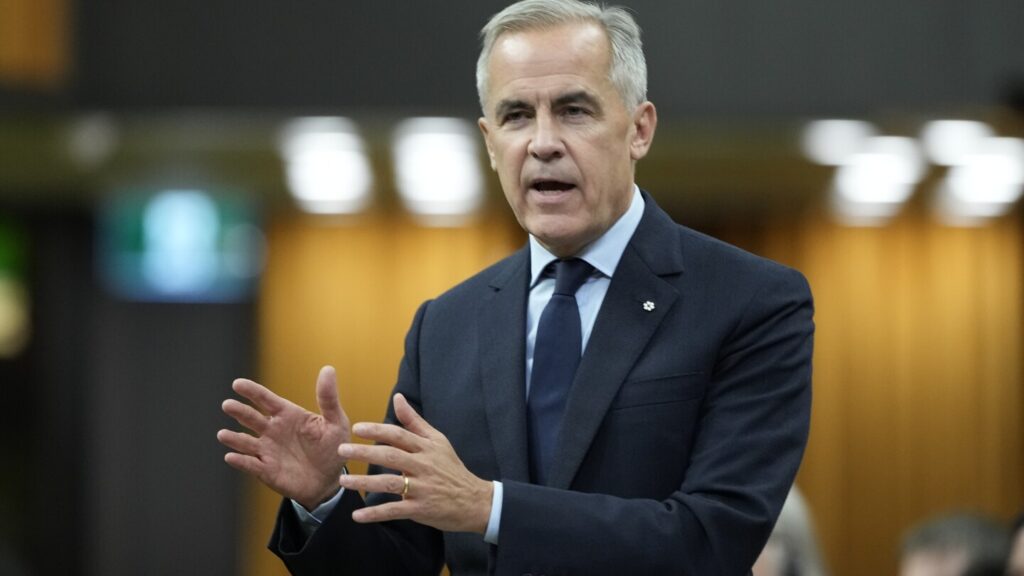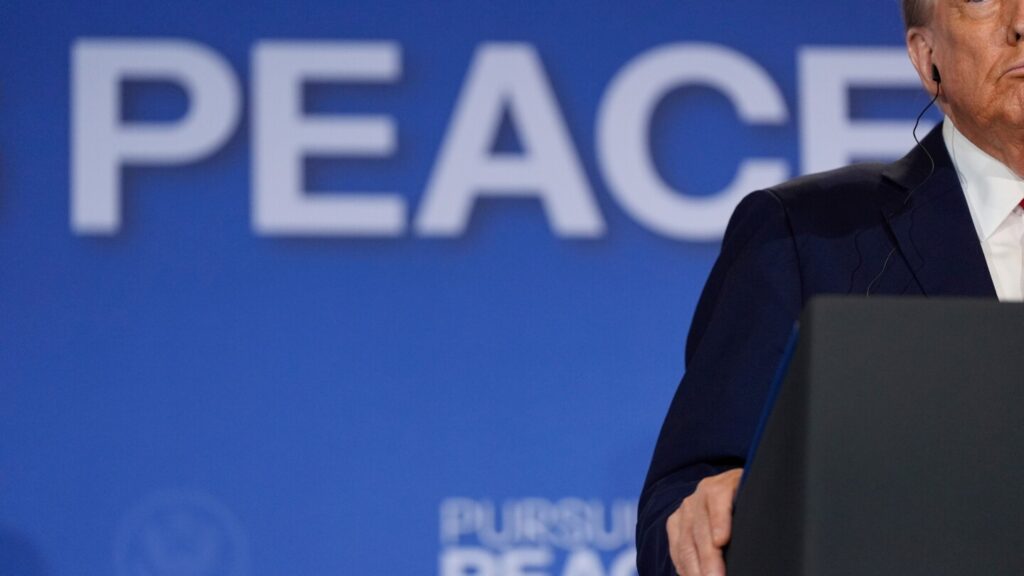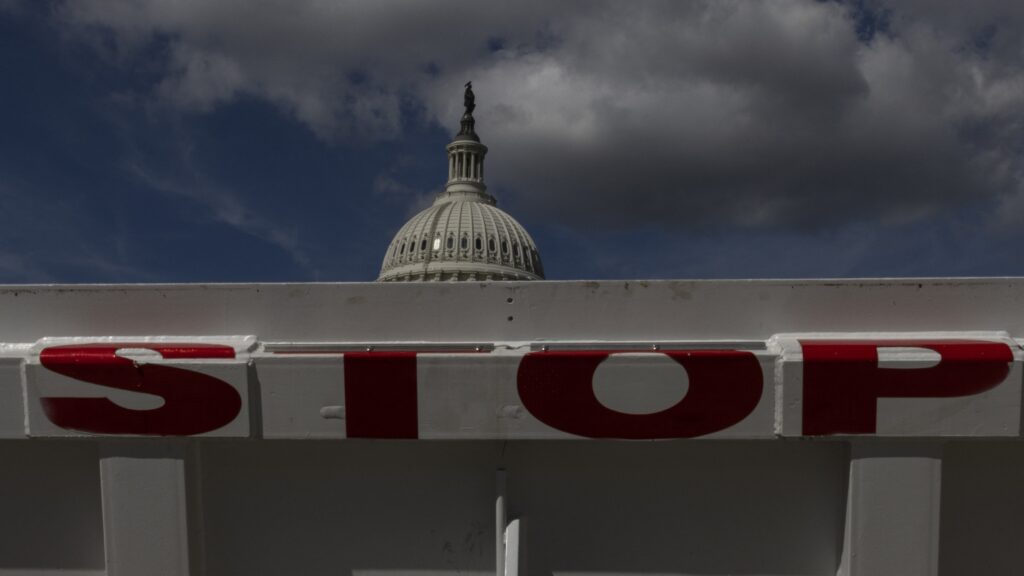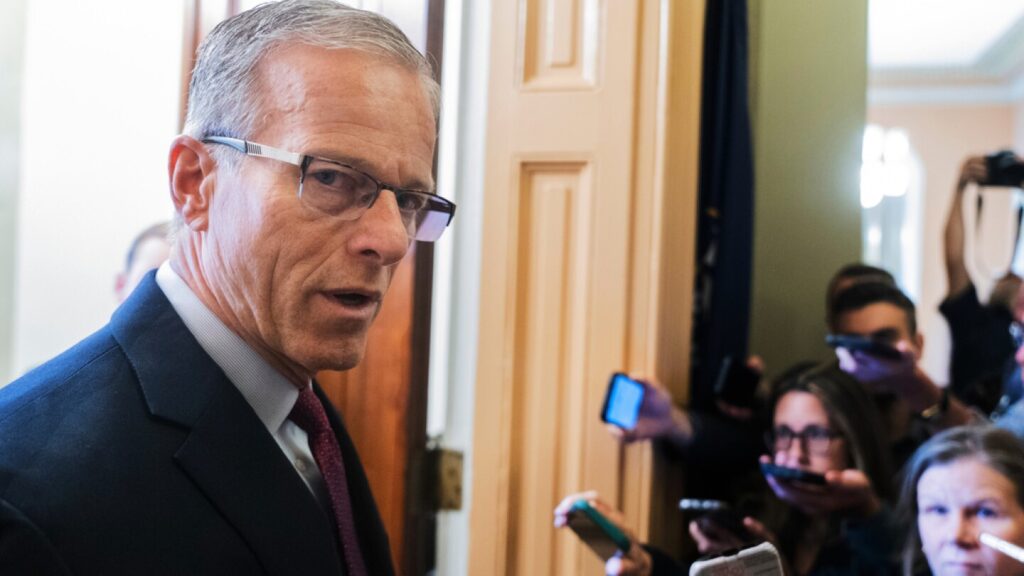He has been making a recovery and has been in stable condition since.The family shared the letter from the President.”Melania and I are devastated to learn of your injury. Please know that my Administration will never stop fighting to clean up our streets and ensure law and order,” Trump wrote in the letter shared on social media.”Your courage reflects the power of the human spirit, and your tenacity is an inspiration to so many. We hope you find comfort in the love of family and friends and that you will be uplifted by the abiding strength and support of all those around you.”Our thoughts and prayers will remain with you and your entire family.
The meeting comes ahead of a review of a free trade agreement and as Trump is engaging in 51st state talk again as Canada asks to be included in Trump’s future Golden Dome missile defense program.In a statement, Carney’s office said the prime minister will travel to Washington on Monday before meeting Trump in the Oval Office on Tuesday. Carney won Canada’s election earlier this year fueled by Trump’s annexation threats and trade war, but he has tried to improve relations ahead of a review of the free trade deal next year.More than 75% of Canada’s exports go to the U.S. and Canada recently dropped many of its retaliatory tariffs to match U.S.
Sean Combs to be sentencedSean “Diddy” Combs will appear before a federal judge in Manhattan on Friday to be sentenced following his conviction earlier this year on federal prostitution-related charges.Following the eight-week trial concluded in July, jurors cleared Combs of the most serious accusations; sex trafficking and racketeering conspiracy. The jury did, however, convict him on two charges of transporting people for prostitution. Judge Arun Subramanian now holds the task of deciding the penalty.
White House halts $2.1bn of Chicago infrastructure fundingThe federal government put $2.1bn earmarked for Chicago infrastructure projects on hold, Office and Management and Budget Director Russ Vought said on Friday, in another jab at a Democrat-led city during the US government shutdown.Vought wrote on X that projects affected included the Red Line extension – which was set to break ground next year and extend public transport to underserved areas in the city – as well as modernization work to a number of transit lines.Vought wrote on social media Friday that the money was “put on hold to ensure funding is not flowing via race-based contracting.”He made a similar announcement earlier this week involving New York, where Vought said $18 million for infrastructure would be paused, including funding for a new rail tunnel under the Hudson River.Key eventsShow key events onlyPlease turn on JavaScript to use this featureDOT cites ‘race-based contracting’ as reason for freezing $2bn of Chicago infrastructure fundingIn Russell Vought’s announcement that the White House is halting $2bn in funding for infrastructure projects for Chicago, he said the move was “to ensure funding is not flowing via race-based contracting”.If follows a similar announcement earlier this week involving New York City, where Vought said $18m for infrastructure would be frozen, including funding for a new rail tunnel under the Hudson River, due to the Trump administration’s belief that the money was “based on unconstitutional DEI [diversity, equity and inclusion] principles”.Now a statement from the US transportation department echoes the sentiment, declaring a “review of Chicago’s discriminatory, unconstitutional processes”. Through an interim final rule issued this week, it notes that DOT is removing the use of the race- and sex-based presumptions of social and economic disadvantage in contracting requirements for federal grants.“Illinois, like New York, is well known to promote race- and sex-based contracting and other racial preferences as a public policy,” the statement reads. It refers to the Chicago Transit Authority’s spending on DBE (Disadvantaged Business Enterprise) firms (where at least 51% of the business is owned and controlled by one or more socially and economically disadvantaged individuals) as “discriminatory, illegal and wasteful contracting practices”.“The American people don’t care what race or gender construction workers, pipefitters , or electricians are,” the statement from the government department adds.It marks the latest instance since the government shutdown began at midnight on Wednesday of the White House punishing Democrats by withholding money for projects in blue states and cities.On the same day as the move targeting NYC, the energy department cancelled almost $8bn in funding for projects in 16 states won by Kamala Harris in the 2024 election.The Eisenhower Presidential Library’s director has exited his position after advocating against giving a sword from the collection to King Charles as a gift during Donald Trump’s recent state visit, according to US media reports on Thursday.Todd Arrington left his post on Monday after being told to “resign or be fired”, he told CBS News, which did not specify who had relayed the message to the historian.The library and museum – located in former US president Dwight D Eisenhower’s home town in Abilene, Kansas – is part of the National Archives and Records Administration (Nara).White House halts $2.1bn of Chicago infrastructure fundingThe federal government put $2.1bn earmarked for Chicago infrastructure projects on hold, Office and Management and Budget Director Russ Vought said on Friday, in another jab at a Democrat-led city during the US government shutdown.Vought wrote on X that projects affected included the Red Line extension – which was set to break ground next year and extend public transport to underserved areas in the city – as well as modernization work to a number of transit lines.Vought wrote on social media Friday that the money was “put on hold to ensure funding is not flowing via race-based contracting.”He made a similar announcement earlier this week involving New York, where Vought said $18 million for infrastructure would be paused, including funding for a new rail tunnel under the Hudson River.Good morning and welcome to our live coverage of US politics, with the shutdown entering its third day.Although the Senate is scheduled to return today for another vote, there is little optimism that a deal is imminent as Democrats hold out for a series of health-focused concessions.Meanwhile, the White House has continued to use its official, taxpayer-funded social media accounts to insult and mock Democrats, treating the standoff more like a political campaign than a negotiation over policy.In addition, a growing number of federal agencies and staff are explicitly blaming Democrats for the shutdown.
A statue of President Donald Trump and sex offender Jeffrey Epstein holding hands has returned to the National Mall after it was removed by the National Park Service last week. Called “Best Friends Forever,” the statue shows Trump and Epstein each with a foot kicked back and a hand flailing into the air, as well as a plaque between the pair titled “In Honor of Friendship Month” that reads: “We celebrate the long-lasting bond between President Donald J. Trump and his ‘closest friend,’ Jeffrey Epstein.” Trump has denied having had a close relationship with Epstein, and has dismissed the controversies surrounding their ties as a “Democratic hoax.” The statue was put back together by the organization responsible for it, “The Secret Handshake.” It had been dismantled and severely damaged after its ordered removal last week, and there are still visible marks of the damage.
President Donald Trump’s budget director announced $2.1 billion in federal infrastructure money for Chicago is being paused as the administration continues to target money for blue cities and states amid the government shutdown.White House Office of Management and Budget Director Russell Vought said the frozen dollars had been allocated to support improvements to Chicago Transit Authority rail lines.Vought earlier announced that $18 billion in infrastructure funds for New York, the home state of Democratic congressional leaders Hakeem Jeffries and Chuck Schumer, had been put on hold and $8 billion in Department of Energy projects in 16 blue states was cut.Democrats have complained about the funding cuts.”We’re less than a day into this shutdown, and Trump & Vought are illegally punishing Democrat-led states,” Sen. Patty Murray, D-Washington, said on social media, calling the moves “mafioso tactics.”Trump has talked about cutting “Democrat things” during the shutdown. The president said on social media Oct.
So, know that is a very real situation under this administration.”The Puerto Rican rapper and singer was revealed as the headliner for the Super Bowl LX halftime show during the game between the Dallas Cowboys and Green Bay Packers on Sept. 28.Bad Bunny skips US tour datesLewandowski’s comments come as Bad Bunny revealed he skipped touring in the United States because of concerns over ICE. In an interview with I-D magazine, published Sept.
President Donald Trump’s bid to win the Nobel Peace Prize has drawn added attention to the annual guessing game over who its next laureate will be.Longtime Nobel watchers say Trump’s prospects remain remote despite a flurry of high-profile nominations and some notable foreign policy interventions for which he has taken personal credit.Experts say the Norwegian Nobel Committee typically focuses on the durability of peace, the promotion of international fraternity and the quiet work of institutions that strengthen those goals. Trump’s own record might even work against him, they said, citing his apparent disdain for multilateral institutions and his disregard for global climate change concerns.Still, the U.S. leader has repeatedly sought the Nobel spotlight since his first term, most recently telling United Nations delegates late last month “everyone says that I should get the Nobel Peace Prize.”A person cannot nominate themselves.
Democrats are demanding that Congress extend health care benefits, while Republicans are trying to wear them down with day after day of voting on a House-passed bill that would reopen the government temporarily, mostly at current spending levels.“Until they have eight or hopefully more — 10 or more — people who want to, decide they want to end the government shutdown, I’m not sure this goes anywhere,” Senate Majority Leader John Thune said Thursday. Although Republicans control the White House and both chambers of Congress, the Senate’s filibuster rules make it necessary for the government funding legislation to gain support from at least 60 of the 100 senators. That’s given Democrats a rare opportunity to use their 47 Senate seats to hold out in exchange for policy concessions.
After years of dead ends and false convictions, the homicides eventually led to Joe Biden signing a federal law in 2022 to allow victims’ families to ask for cold cases to be reopened.But the murders still remained unsolved for nearly 34 years – until now.Law enforcement officials announced on Monday a “significant breakthrough” driven by new technology around ballistics and DNA, said Austin’s mayor, Kirk Watson, at a press conference on Monday.A photo of Jennifer and Sarah Harbison, displayed as police announce a break in the case. Photograph: Bob Daemmrich/Zuma Press Wire/ShutterstockThe evidence points to Robert Eugene Brashers, who was identified after his death as a serial killer. More murders may be added to his toll as DNA analyses become more advanced and widespread.Scientific and technological advances are identifying previously unknown serial killers like Brashers.“The only physical evidence located at that scene has been matched to him,” said Austin’s chief of police, Lisa Davis.The case isn’t closed yet, but this is a “major step”, and Brashers is believed to be the sole perpetrator, Davis said.Eliza’s sister Sonora Thomas, now a therapist, said her mind was split in two when Eliza was killed.“One part of my brain has been screaming, ‘What happened to my sister?’, and the other part kept repeating, ‘I will never know.
Maine was among the first states to ban Pfas in cookware and the industry has claimed brides in the state are upset because they can’t get Teflon pans on their registries, advocates say.Pfas compounds like Ptfe, also called Teflon, are most commonly used in pans and industry has claimed the chemical is safe and should not be classified as a Pfas. New Mexico exempted Ptfe from its cookware ban, but most governments classify it as a Pfas and regulate it. While science suggests Ptfe poses less of a health threat in isolation than other more dangerous Pfas, some peer-reviewed research highlights risks throughout its life cycle.Highly toxic Pfas are used to manufacture Ptfe, and the former can end up in the environment or leftover on a pan.
Whitby/Getty Images for The Red Sea International Film Festival/Getty Images hide caption toggle caption Neilson Barnard; Neilson Barnard/Getty Images for The Recording Academy; David Livingston; Dia Dipasupil; Theo Wargo/Getty Images for Karl Lagerfeld; Tim P. Whitby/Getty Images for The Red Sea International Film Festival/Getty Images Over 550 celebrities have relaunched the Committee for the First Amendment to advocate for what they call a “defense of our constitutional rights.”This week’s Far-Flung Postcards series takes you to Maidan Square in Kyiv, Ukraine, where NPR’s team covering the country stumbles across Ukrainian President Volodymyr Zelenskyy on a stroll.The University of Pittsburgh launched the first-of-its-kind Horror Studies Center, reinforcing its dedication to the study of the horror genre. (via WESA) This newsletter was edited by Yvonne Dennis.
Trump has given no indication he’s willing to negotiate and entertain Democratic demands for changes to health care policies as part of a funding resolution to reopen the government.The White House has also continued to troll House Democratic Leader Hakeem Jeffries with AI videos portraying Jeffries in a sombrero and fake mustache.Nevertheless, Jefferies on Wednesday predicted Trump will come back to the negotiating table because of “public sentiment.”“The public knows that Donald Trump and Republicans have shut the federal government down,” Jeffries told reporters, “and that they’re continuing to engage in the chaos and the cruelty and the corruption that we’ve seen from the administration from day one of the presidency.”‒ Joey Garrison Government out-of-office emails blame Dems for shutdownOfficial email accounts at the U.S. Department of Education began sending out-of-office messages are pointing fingers at Democrats for the funding crisis.”Thank you for contacting me,” said one message. “On September 19, 2025, the House of Representatives passed H.R.
Updated [hour]:[minute] [AMPM] [timezone], [monthFull] [day], [year] WASHINGTON (AP) — White House budget director Russ Vought said the Trump administration will withhold $2.1 billion for Chicago infrastructure projects, expanding funding fights that have targeted Democratic areas during the government shutdown.The pause affects a long-awaited plan to extend the city’s Red Line train. Vought wrote on social media Friday that the money was “put on hold to ensure funding is not flowing via race-based contracting.”He made a similar announcement earlier this week involving New York, where Vought said $18 billion for infrastructure would be paused, including funding for a new rail tunnel under the Hudson River.In New York’s case, Trump’s Transportation Department said it had been reviewing whether any “unconstitutional practices” were occurring in the two massive infrastructure projects but that the government shutdown, which began Wednesday, had forced it to furlough the staffers conducting the review.The suspension of funds is likely meant to target Senate Democratic leader Chuck Schumer of New York, whom the White House is blaming for the impasse. He said the funding freeze would harm commuters.___This story has been corrected to show $18 billion, not $18 million, was held in New York.
(AP Video: Mike Pesoli) Updated [hour]:[minute] [AMPM] [timezone], [monthFull] [day], [year] Hopes for a quick end to the government shutdown were fading Friday as Republicans and Democrats dug in for a prolonged fight and President Donald Trump readied plans to unleash layoffs and cuts across the federal government.Senators will return to the Capitol for another vote on government funding on the third day of the shutdown, but there has been no sign of any real progress toward ending their standoff.“Until they have eight or hopefully more — 10 or more — people who want to, decide they want to end the government shutdown, I’m not sure this goes anywhere,” Senate Majority Leader John Thune said Thursday.Although Republicans control the White House and both chambers of Congress, the Senate’s filibuster rules make it necessary for the government funding legislation to gain support from at least 60 of the 100 senators. That’s given Democrats a rare opportunity to use their 47 Senate seats to hold out in exchange for policy concessions. The party has chosen to rally on the issue of health care, believing it could be key to their path back to power in Washington.
Hamas to demand key revisions to Trump Gaza plan before accepting, sources sayPalestinians amid the rubble of Gaza City last month. Humanitarian officials say Hamas still has a strong presence in the territory. Photograph: Yousef Al Zanoun/APHamas will demand key revisions to Donald Trump’s Gaza ceasefire proposal but is likely to accept the plan in the coming days as a basis for renewed negotiations, analysts and sources close to the group have suggested.Trump imposed a deadline of “three or four days” from Tuesday for Hamas to accept his 20-point plan, which aims to bring the two-year war in Gaza to a close and allow an apparently indefinite international administration of the devastated territory, or “pay in hell”.
Immigration offenses account for more than half of the federal criminal caseload, according to data compiled by the Transactional Records Access Clearinghouse database, with illegal entry and re-entry cases accounting for the lion’s share.The possibility of adding thousands of new inmates to federal prisons on decade-long sentences would have a massive impact on the Bureau of Prisons, whose total inmate population stands at approximately 155,000.“The cascading effects of subjecting thousands of individuals to a 10-year mandatory minimum sentence cannot be overstated,” reads a letter to congressional leaders penned by the Federal Public and Community Defenders Legislative Committee. “The entire system would be driven by the demands of section 1326 [illegal re-entry] cases, at the expense of violent crimes and other offenses that pose a far greater threat to public safety.”Criminal justice and legal groups also warn that the bill could paralyze the federal courts. Nearly all illegal entry and re-entry cases are convicted through plea deals with reduced sentences in order to shuttle them quickly through the system.But it wouldn’t make sense to plead guilty to a crime carrying a 10-year mandatory prison sentence.“If this passed, the federal courts would implode,’’ said Kara Hartzler, an attorney with Federal Defenders of San Diego.
Ted Cruz, a Republican. “In real time we are seeing what happens when that wall of independence is torn down and an agency commissioner who is supposed to be independent under the law appears to be answering directly to the president,” Michael Sozan, a senior fellow at the Center for American Progress, a liberal think tank.The FCC and White House did not provide comment for this story, but Trump called Carr “a great American patriot” and said he disagreed with Cruz’s comments.The Unitary ExecutiveThe Supreme Court will hear a case in December in which the Trump administration is seeking to reverse a precedent that protects many of these board members from at-will firing by the president, and legal scholars say the writing has been on the wall for years for the majority-conservative court to side with the Trump administration.The Trump administration is setting the legal groundwork to gain control over dozens of independent agencies similar to the FCC by firing members of independent boards, getting sued, and then telling the courts the agencies unlawfully stepping on his rights as the nation’s sole executive.Underlying all of this is the unitary executive theory that says executive power lies solely with the president, and the people who wield it on his behalf should be able to be fired by him. That often includes making rules and policies on issues ranging from the safety of kids’ toys to what Americans can watch on TV.For example, the Securities and Exchange Commission, which is designed to protect investors and keep financial markets fair, is one of more than two doen agencies that are legally similar to the FCC. So is the National Credit Union Administration, where Trump fired Democratic members in April, and the Federal Election Commission.”You can agree with the agency action, you can disagree with the agency action, but at the end of the day, you know whom to hold accountable for the actions that agency has taken,” is how Zack Smith, a senior legal fellow at the conservative Heritage Foundation, described Trump administration’s position.Smith said that vision of presidential power goes back to the framers of the Constitution and it would apply to all presidents “whether you have a Republican in office, whether you have a Democrat in office, whether you have an independent in office.”Thomas Berry, the director of constitutional studies at the libertarian Cato Institute, says he supports the unitary executive theory and wants independent agencies to look more like Cabinet agencies, which implement the president’s agenda, and whose leaders can be fired by the president.
Locked out of these futures – for better or worse – we’re no longer tethered to economic paths that once rooted people to jobs, and more importantly, to communities.Enter disillusionomics: the economics of a generation raised on promises that never materialized. It’s a reaction to a system where traditional benchmarks of success have become largely unattainable, and even if attained, don’t deliver the same security they once did. Functioning well, the economy is supposed to provide security and opportunity.
All times Eastern.Fri 3 Oct Game 1: Phoenix at Las Vegas, 8pm (ESPN)Sun 5 Oct Game 2: Phoenix at Las Vegas, 3pm (ABC)Wed 8 Oct Game 3: Las Vegas at Phoenix, 8pm (ESPN)Fri 10 Oct Game 4: Las Vegas at Phoenix, 8pm (ESPN)Sun 12 Oct Game 5: Phoenix at Las Vegas, 3pm (ABC)*Wed 15 Oct Game 6: Las Vegas at Phoenix, 8pm (ESPN)*Fri 17 Oct Game 7: Phoenix at Las Vegas, 8pm (ESPN)**if necessaryThe Mercury are here because …… of strong team defense. The Mercury have registered the best defense rating in the playoffs, led by perpetual MVP contender Alyssa Thomas. But nobody in their rotation is a slouch defensively.
As President Donald Trump intensifies his efforts to hobble the infrastructure that supports Democratic candidates and causes, many liberal advocacy and philanthropic groups say they have moved to protect their organizations, their finances and personnel like never before, according to CNN’s interviews with nearly a dozen officials in the nonprofit sphere. “People are trying to reimagine how to do the work and how to do it safely,” said Jess O’Connell, a longtime Democratic strategist who helps oversee the Democratic Security Project, a nonprofit launched last year that helps organizations harden their operations against risks like physical threats and potential cyber-attacks. It has trained about 8,000 people working in about 1,200 organizations, she said.








